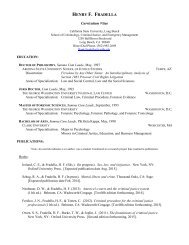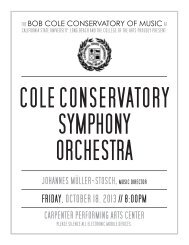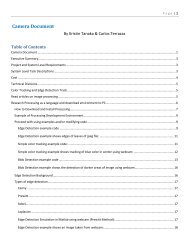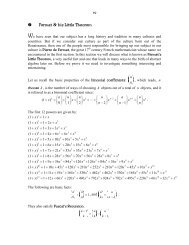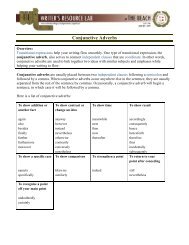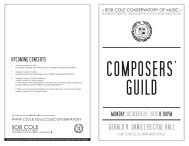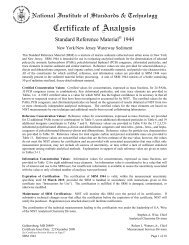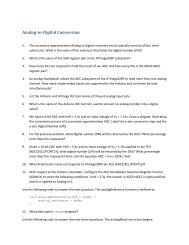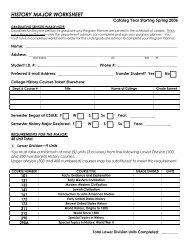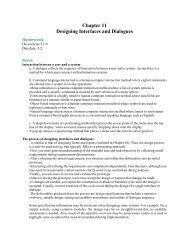Untitled - California State University, Long Beach
Untitled - California State University, Long Beach
Untitled - California State University, Long Beach
Create successful ePaper yourself
Turn your PDF publications into a flip-book with our unique Google optimized e-Paper software.
Foer raises the question, “Whose story is this?” Jonathan sets out to find<br />
his history and in doing so finds a wasteland. Alex, however, ends up accidentally<br />
stumbling across a revelation about his own family history that,<br />
had he not joined Jonathan on his journey, likely would have remained<br />
secret. His Grandfather, he discovers, once lived in a neighboring shtetl<br />
named Kolki. The town faced a similar fate to Trachimbrod: the Nazis<br />
came, lined the villagers up, and demanded that everyone, including<br />
Jews, identify at least one Jew to be shot. Alex’s Grandfather reveals that<br />
when his turn came, he pointed to his best friend, a Jew named Herschel,<br />
and as a result he was murdered. Considering that it is Alex who makes<br />
a discovery about his past, and it is Alex’s voice that controls two out of<br />
the three of the novel’s narratives, it might seem that the story is actually<br />
Alex’s rather than Jonathan’s. Alex, however, knows that it is important<br />
that both of their voices work to tell their stories. In Alex’s second-to-last<br />
letter to Jonathan, he writes, “We are talking now, Jonathan, together;<br />
and not apart. We are with each other, working on the same story, and<br />
I am certain you can also feel it. Do you know that I am the Gypsy girl<br />
and you are Safran, and that I am Kolker and you are Brod, and that I<br />
am your grandmother and you are your Grandfather, and that I am Alex<br />
and you are you, and that I am you and you are me?” (Foer 214). Alex<br />
references every important relationship in Jonathan’s fictitious Trachimbrod<br />
narrative, placing himself and Jonathan in those roles. In doing so,<br />
he is attempting to tell Jonathan that the voices in Jonathan’s stories have<br />
become entwined with their own voices. His proclamation, “We are talking<br />
now, Jonathan, together; and not apart … working on the same story<br />
… I am Alex and you are you, and I am you and you are me,” means that<br />
Jonathan’s voice and his own are now inextricable. Without their voices<br />
working together in unison and without the other voices present in each<br />
of their narratives, the story could not be completely told.<br />
A similar sentiment is echoed in the chapter in which Alex’s Grand-<br />
36 | Mehlinger<br />
father reveals his secret. Alex does not write his Grandfather’ dialogue in<br />
quotation marks, and thus his own narrative voice mingles in the midst<br />
of the revelation, a six page block of text that is set apart by parentheses<br />
in a way that Propst says “makes it seem as though Alex is cradling the<br />
words in his hands” (Propst 44). She argues, “Through these visual cues,<br />
Alex implies that their shared story is also the story of Grandfather and<br />
Herschel and the ghosts that he, Grandfather, and Jonathan carry with<br />
them” (44). This concept appears at the end of his Grandfather’s confession<br />
when Alex’s voice seeps in and again puts him and Jonathan in the<br />
places of other characters:<br />
Jonathan where do we go now what do we do with what we<br />
know Grandfather said that I am I but this could not be true the<br />
truth is that I also pointedatHerschel and I also said heisaJew<br />
and I will tell you that you also pointedatHerchel and you also<br />
said heisaJew and more than that Grandfather also pointedatme<br />
and said heisaJew and you also pointedathim and said heisa-<br />
Jew and your grandmother and Little Igor and we all pointedateachother<br />
(Foer 252).<br />
By placing himself, Jonathan, Little Igor, and Jonathan’s grandmother<br />
into the positions of Grandfather and Herschel, Alex is acknowledging<br />
that what his Grandfather did is something that affects both of their<br />
families. Just as his Grandfather pointed at his friend in Kolki, someone<br />
else probably pointed at members of Jonathan’s family in nearby<br />
Trachimbrod. Having both been born from generations affected by the<br />
Holocaust, Alex must ask what he or anyone else would have done in his<br />
Grandfather’s place, and his conclusion is that they all would have done<br />
the same. In this way, his Grandfather’s story is just as much his story and<br />
Jonathan’s story.<br />
The complex tri-narrative structure in Everything Is Illuminated allows<br />
Foer to complicate voice in a way that lends greater meaning to<br />
Mehlinger | 37



